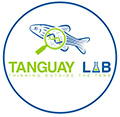The zebrafish model is the only available high-throughput vertebrate assessment system, and it is uniquely suited for studies of in vivo cell biology. A sequenced and annotated genome has revealed a large degree of evolutionary conservation in comparison to the human genome. Due to our shared evolutionary history, the anatomical and physiological features of fish are highly homologous to humans, which facilitates studies relevant to human health. In addition, zebrafish provide a very unique vertebrate data stream that allows researchers to anchor hypotheses at the biochemical, genetic, and cellular levels to observations at the structural, functional, and behavioral level in a high-throughput format. Breakthroughs in next generation sequencing, multi-omics, epigenetics, transgenic/reporter lines and methods for genetic manipulation, such as the CRISPR-Cas9 system allow us to discover the genes that mediate the toxicity of environmental chemicals and drugs.
Selected Publications
- Svoboda, K.R., S. Vijayaraghavan, and R.L. Tanguay, Nicotinic receptors mediate changes in spinal motoneuron development and axonal pathfinding in embryonic zebrafish exposed to nicotine. J Neurosci, 2002. 22(24): p. 10731-41. PMID: 12486166
- Saili, K.S., S.C. Tilton, K.M. Waters, and R.L. Tanguay, Global gene expression analysis reveals pathway differences between teratogenic and non-teratogenic exposure concentrations of bisphenol A and 17beta-estradiol in embryonic zebrafish. Reprod Toxicol, 2013. 38: p. 89-101. PMCID: PMC3690774
- Tilton, F., J.K. La Du, M. Vue, N. Alzarban, and R.L. Tanguay, Dithiocarbamates have a common toxic effect on zebrafish body axis formation. Toxicol Appl Pharmacol, 2006. 216(1): p. 55-68. PMID: 16797628
- Knecht, A.L., B.C. Goodale, L. Truong, M.T. Simonich, A.J. Swanson, M.M. Matzke, K.A. Anderson, K.M. Waters, and R.L. Tanguay, Comparative developmental toxicity of environmentally relevant oxygenated PAHs. Toxicol Appl Pharmacol, 2013. 271(2): p. 266-75. PMCID: PMC3976560

